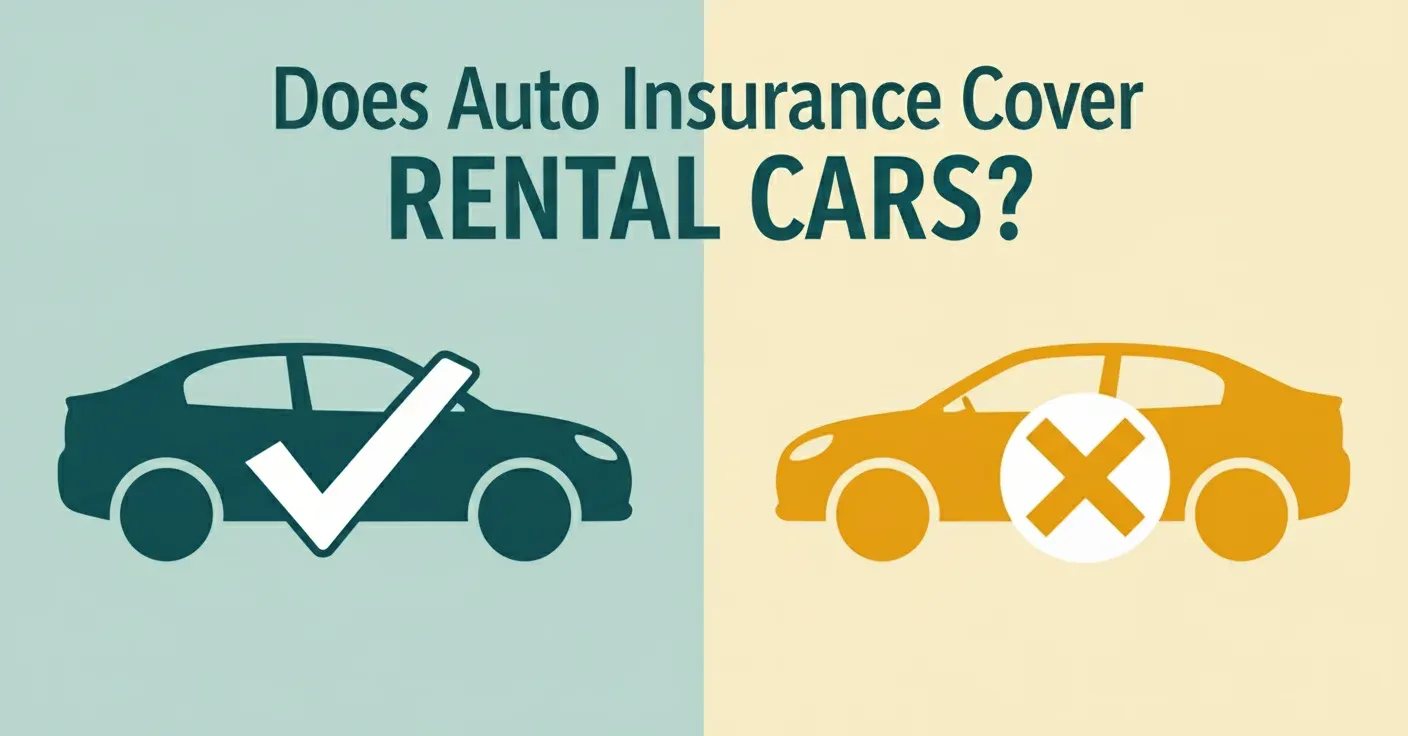
Does Auto Insurance Cover Rental Cars?
Car rental can appear straightforward at first glance.

You surrender your license, sign some documents, take the keys, and away you go. But while you're in line at the counter, maybe just off a plane or running to a meeting, you're suddenly confronted with a question: "Would you like to purchase rental insurance as part of your booking today?"
And before you know it, the process is a bit less simple.
If you're like most drivers, you might stop to ask yourself if your current automobile insurance policy is sufficient. Should you err on the side of caution and pay more? Or are you already adequately covered without knowing it?
Let's break down the ins and outs of rental car coverage under auto insurance so you can approach your next rental with confidence and clarity, not confusion.
How Your Auto Insurance Extends to Rental Vehicles
The good news? If you have a personal auto insurance policy in place, there's a good bet you're at least partly or even fully covered when renting a car especially if you rent the vehicle for personal use.

As a general rule, the insurance you maintain on your personal vehicle automatically covers your rental. That is, if you have liability, comprehensive, and collision insurance, those coverages will usually apply to the rental car as well.
Suppose your existing insurance features:
- Liability protection – This covers injury or damage to other people if you are responsible for an accident while operating the rental.
- Collision coverage – This pays to have the rental car repaired if you get into an accident, whether or not you're at fault.
- Comprehensive coverage – This covers you for non-accident damage such as vandalism, hail, fire, or theft.
So if suddenly a storm erupts and a tree branch falls on your rental and destroys it, your comprehensive coverage is probably going to cover you the same way that it would have if it had happened to your own vehicle.
But don't count on it yet, because there are some qualifications you should consider.
When Your Coverage May Not Work
Auto insurance is not always one-size-fits-all.
There are some situations in which your own policy will not provide rental car coverage or will leave you substantially unprotected.
For instance, if you're hiring a vehicle for business use instead of personal travel, your coverage might not apply. Some policies are for personal-use only, so driving a hired car for work (even on a temporary basis) might leave you vulnerable.
Then, of course, there's travel outside the country. Most U.S.-based automobile policies won't cover foreign rentals in the U.S. and Canada. Traveling to Europe or Mexico? You might have to buy it through the rental agency or a third-party vendor.
And what about exotic cars or luxury cars? If you're leasing a sports car or a foreign car, your coverage may not include it at all. Insurance companies usually have vehicle class limitations on extensions of coverage, so double-checking would be a good idea.
Moral of the story? Always read your policy and press your insurer for direct answers before assuming.
What About the Insurance They Sell at the Counter

If your own policy includes rental coverage, must you purchase extra insurance from the rental company? The answer: perhaps, perhaps not it is based on how comfortable you are and what coverage you already have.
At the counter, you'll likely be presented with a variety of insurance products, typically marketed under unfamiliar names such as:
- Collision Damage Waiver (CDW)– This is not actually insurance, but it ensures that the rental agency won't make you pay if the vehicle gets stolen or damaged.
- Supplemental Liability Insurance – Provides additional liability coverage in addition to your personal policy's limits.
- Personal Accident Insurance – Pays for medical expenses for you and your passengers.
- Personal Effects Coverage – Insures personal items that are stolen from the rental car.
If you already have full coverage through your own policy and are happy with your deductible, you may not need to buy anything additional. But if your own insurance only covers the minimum or if you don't want to pay out of pocket in case of a smash-up the CDW may provide welcome peace of mind.
Don't Forget Your Credit Card Benefits

Here's one you might not know: a lot of high-end credit cards offer car rental insurance, particularly if you pay the entire rental with that card. Such coverage tends to be secondary, which is to say it only pays after your own car insurance has kicked in. Some higher-end credit cards, however, offer primary coverage, so your own auto insurance never needs to enter into the picture.
Credit card rental coverage typically includes damage or theft of the vehicle (similar to CDW), but not always liability insurance or personal injury coverage. That’s an important distinction.
Before relying on your card's protection, call your credit card company or check your benefits guide. The fine print matters—and you’ll want to know what’s covered, what isn’t, and any exclusions before assuming you’re in the clear.
Before You Rent: A Smart Driver’s Checklist
To avoid last-minute decisions at the rental counter, take a few simple steps ahead of time:
- Review your current auto insurance policy. Look for terms that mention rental cars and call your agent if you’re unsure.
- Check your credit card’s rental coverage. Know whether it’s primary or secondary and what’s included.
- Pose specific questions to the rental agency. What does their CDW protect against? What if it gets stolen? Are there any limitations?
- Take your travel into consideration. Are you going abroad or renting a vehicle for business? These things may impact whether your current coverage stands.
Having such clarity beforehand will save you from distress, pointless expenditure, or worse being underinsured when things do go awry.
Is Rental Car Insurance Worth the Extra Fee?
It depends on your individual circumstances and your risk tolerance. If you already have full coverage and you're paying with a credit card that has built-in protection, you may be covered all around. Then paying an additional $20–$30 a day for rental insurance may not be worth it.
But if your own car policy is restricted, or you are not sure about your credit card coverage, the added expense may be worth the assurance if you are renting in a crowded city, a foreign land, or in inclement weather.
After all, even good drivers can't anticipate a runaway cart, a surprise hailstorm, or a crazy driver in the next lane.
Final Thoughts: Know Before You Go
Ultimately, knowing how rental car coverage works is all about preparation. The more you understand your current insurance, the more informed you will be at the rental counter and the less chance you will have of overspending or being underinsured.
When in doubt, don't guess. Contact your insurance company, credit card company or even the rental agency beforehand. And if everything else fails, the licensed insurance advisor can clarify the details for you in no time.
Get an Insurance Expert to Talk You Through Before You Rent
Still not convinced whether your car insurance covers rental cars? That is where we step in.
At Savvital, our agents can guide you through what you have now, what covers rentals, and assist you in deciding if you want more coverage. We'll even look for discounts or add-ons that you might not be aware of.
Published on 29 Aug 2025
Author: Savvital Team